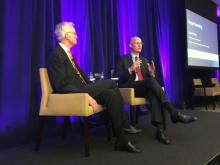racial segregation

IN JUNE 1964, 54 years ago this month, James Chaney, Andrew Goodman, and Michael “Mickey” Schwerner were asked by leaders of the Congress of Racial Equality to investigate the burning of a black church that had doubled as a Freedom School in Neshoba County, Miss.
More than 1,000 people, including college students, boarded buses bound for Mississippi that year. Over the preceding four years, these young people had witnessed a Southern sea change, from school desegregation to the integration of lunch counters, buses, bus depots, and movie theaters. They witnessed the Children’s March in Birmingham—hoses, dogs, terror faced down by black children who did not run. They stood their ground and they filled jails and they sang about overcoming. These previously silenced and subjugated people were now using the only thing they had—their bodies—to break through. And they had broken through.
Nashville, Greenville, Mont-gomery, Birmingham ... Now, it was Mississippi’s turn. James Meredith had served as the tip of the spear in 1962 when he registered for courses at Ole Miss. Mississippians lost their minds. The ensuing riot required 31,000 National Guards to quell it and left two dead and hundreds wounded. Meredith did register—and was graduated—but Medgar Evers, field secretary of the NAACP in Mississippi, was assassinated the following year, in his driveway.

More than 60 years ago, the divinity school denied him admission because he is black. Speaking at a service in Goodson Chapel, he asked: “What is it that God would have Duke Divinity School do in light of that history? For if one is not honest about that history, one can’t be fully present.”

The church’s predominately black congregation once mirrored the neighborhood’s demographics. But today hip and eclectic East Nashville, with its rising property values and trendy restaurants, draws white millennials, said the Rev. Morris Tipton Jr., the church’s pastor.
Given the neighborhood’s shift, is Tipton worried about the church’s future?

Critical to the success of the movement is the fact that corporations are not simply tolerating activists such as Daly.
Instead, they increasingly see the socially responsible agenda as good business; and, perhaps more important, so do investment firms that are responding to the growing demand for portfolios that reflect a client’s values while also making money as effectively as any other investment.
[Editor's Note: In anticipation of the anniversary of the March on Washington on August 28, 1963, God's Politics will feature a series of posts on the legacy of Dr. Martin Luther King.
Given Glenn Beck's threat that "the hammer is coming," I have been keeping my eyes and ears open to see and hear what attacks he might next make on us or the growing movement of Christians who share with us the call to